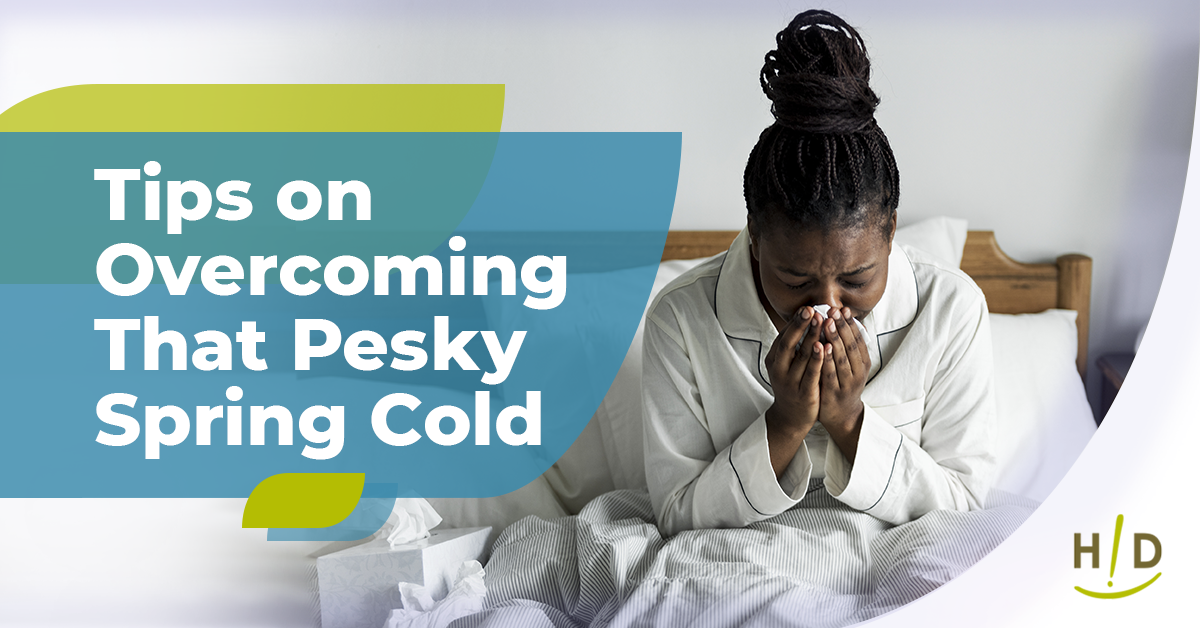Just when you wanted to sleep a little longer, a pesky robin celebrating the arrival of spring starts singing its heart out in the tree outside your bedroom window. Perhaps you shouldn’t have cracked the window open, but, as you lie there considering your next move, you start to realize that you aren’t feeling well. Could you have caught a cold? You start to dread getting up and facing the day.


Could It Be an Allergy?
Dr. Robert Weiss, a board-certified otolaryngologist, says, “Many think they’ve caught a cold and can’t tell the difference.” There are eight ways to tell the difference between a cold and spring allergies—and what you can do about them.- Fever. A fever never accompanies allergy attacks. Colds often involve low-grade fevers with a body temperature below 101 degrees, but this could run higher if the virus is aggressive.
- Cough. Common colds often involve some form of cough, while you might not experience a cough during an allergy attack.
- Sneezing. Frequent and multiple sneezes are typical of an allergy attack, especially if you aren’t feeling sick.
- Runny, stuffy nose. Nasal congestion is a common symptom for both allergy and cold sufferers. This results from increased blood flow to the mucous membranes of the nose and sinus cavity, as the immune system responds to the condition at hand. Generally, allergic mucus is clear and watery, while an infection causes thick, colored mucus.
- Headache. Congestion can often cause a feeling of pain or pressure within the sinuses. This is sometimes called a “sinus headache.” This can occur in both allergies and colds. But, if the headache is one-sided, that could indicate a more serious bacterial infection.
- Itchy eyes, ears, and throat. Itching in these areas almost always suggests an allergic reaction.
- Sore throat. Both colds and allergies can result in sore throats. However, allergy patients often describe the pain as “scratchier” while colds produce a more severe, “sharp” sore throat.
- Swollen glands. Swelling of the lymph nodes in the neck and under the chin are seldom as a result of an allergic reaction but frequently experienced with the common cold.
Could It Be a Spring Cold?
Okay, you’ve decided that it seems to be a cold, which happens every year: As soon as the winter weather breaks and temperatures start rising, you come down with a cold. You’re not alone. While the most significant surge in human rhinovirus infections occurs in the fall, springtime also ushers in a second peak season for common colds. Unfortunately, if your throat is already tingling or scratchy, it’s likely to be that one of the 200 strains of the common cold virus—most commonly the rhinovirus—has already settled in for the next 7 to 10 days. While it seems unlikely that allergies are the culprit this time, Dr. Bradley Chipps, president of the American College of Allergy, Asthma & Immunology, reminds us that the nasal inflammation caused by seasonal allergies makes it easier for viruses to “set up shop” in your nose. Even if you don’t have allergies, big seasonal swings in barometric pressure, temperature, and wind can irritate your airways and nasal passages—and compromise your immune system’s built-in bulwarks against colds and infections, adds Dr. Chipps. Research also suggests the common cold flourishes in cooler temperatures. One recent study from Yale University found that a seven-degree drop in ambient temperature can mess with your body’s ability to stop cold viruses from proliferating. “Every time we’re exposed to infections, we try to counter this by secreting interferons, which are important for blocking viruses,” says Akiko Iwasaki, a professor of immunobiology at Yale School of Medicine. “We found that if you reduce temperatures from 37 to 33 degrees Celsius”—98.6 degrees to 91.4 degrees in Fahrenheit—“a change that can dampen the immune response and allow viruses to replicate more.” This helps explain why cold infection rates increase when temperatures are lower. But what about springtime? It’s possible that people are more likely to venture outdoors in March and April than in the wintertime—when the weather has warmed up a bit but is still cool enough to encourage the spread of cold viruses, Iwasaki says. While a 50-degree temperature in the fall may keep you indoors, the same thermostat reading in spring could spur you to get outdoors for a run or a bike ride.
What if You Have a Cold?
Now that you have figured out that you do have a cold and can expect to be sick for one to two weeks, it doesn't mean you have to be miserable. Besides getting enough rest, there are many remedies might help you feel better:- Stay hydrated. Water, juice, clear broth, or warm lemon water with honey helps loosen congestion and prevents dehydration. Stay away from alcohol, coffee, and caffeinated sodas, which can make dehydration worse.
- Rest. Your body needs to heal.
- Soothe a sore throat. A saltwater gargle—1/4 to 1/2 teaspoon salt dissolved in an 8-ounce glass of warm water—can temporarily relieve a sore or scratchy throat. You can also try ice chips, sore throat sprays, lozenges, or hard candy.
- Combat stuffiness. Over-the-counter saline nasal drops and sprays can help relieve stuffiness and congestion.
- Relieve pain. As an adult, you can take acetaminophen (Tylenol, others), ibuprofen (Advil, Motrin IB, others), or aspirin. Immune system boosters and supplements will also help your body heal and help fight viruses.
- Sip warm liquids. A cold remedy used in many cultures, taking in warm liquids, such as soup, tea, or warm apple juice, might be soothing and ease congestion by increasing mucus flow.
- Add moisture to the air. A cool-mist vaporizer or humidifier can add moisture to your home, which might help loosen congestion. Change the water daily and clean the unit according to the manufacturer's instructions.
- Try over-the-counter (OTC) cold and cough medications. For adults and children older than age five, OTC decongestants, antihistamines and pain relievers might offer some symptom relief. However, they won't prevent a cold or shorten its duration, and most have some side effects.
Cold Prevention
The upsurge in colds in the springtime may also have to do with spring break, Iwasaki adds. “Kids are coming back from trips and spreading things.” With several different variables conspiring to make you sick when the seasons change, what can you do to prevent colds as the weather shifts? “Keeping your nose area warm can keep your immune defenses elevated,” Iwasaki says. Even on cool spring days, wearing a scarf around your face really can make a difference, she adds. Washing your hands regularly—especially before eating or touching your eyes, nose or mouth—is probably the best way to keep illness-causing microorganisms from getting into your body. Sticking to a diet filled with plants and vegetables is also a great way to boost your immune system, to help avoid catching a cold in the first place. The Hallelujah Diet has a number of immune boosting supplements that will help build up your body’s defenses.
The Takeaway
Apart from taking precautions against passing on your cold to others, regular exercise and stress-lowering meditation are research-backed ways to significantly lower your risk for colds. The only way to deal with that pesky spring cold is to ride it out. The very best thing you can do is take the following actions to ease your recovery and avoid passing your cold on to others:- Washing your hands frequently with soap and water
- Avoiding any unnecessary physical contact where you could contract or pass on the virus
- Covering your cough or sneeze
- Staying hydrated
- Getting plenty of rest








